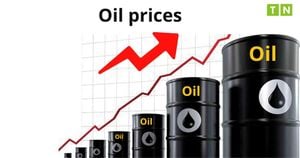Canadian businesses are bracing themselves for the potential fallout of sweeping tariffs proposed by U.S. President Donald Trump, with economists warning of possible repercussions on the Canadian economy. Despite the uncertainty, experts note some positive domestic economic signals.
Claire Fan, an economist with RBC, expressed cautious optimism during her recent interview with BNN Bloomberg. She noted improvements in Canada’s economic backdrop as of the fourth quarter of last year, largely due to recent interest rate cuts. From her perspective, these cuts are facilitating increased spending and investment, helping Canadian households manage their mortgages more comfortably.
Fan stated, "Rate cuts from the Bank of Canada, larger ones toward the end of last year, continue to trickle through to support economic activity, making it easier for Canadian households to pay their mortgages… and for Canadian businesses to borrow and to invest." She anticipates the Bank of Canada to continue these cuts to bolster the economy, projecting improvements as 2025 approaches.
Adding to her thoughts, Fan highlighted the retail sale data released by Statistics Canada, which indicated stable spending patterns with expectations of improvement. While sales figures remained flat from October to November, December projected significant growth, likely influenced by the introduction of the federal GST holiday.
"... for many Canadians, holiday shopping was nudged toward later in December because of the GST holiday announced on Nov. 21," Fan explained. "But then the bounce-back was pretty substantial actually in December... so it kind of just tells us consumers were just waiting for the tax holiday."
Despite positive indicators, the looming threat of new tariffs has cast a shadow on the economic outlook. Trump’s proposition of 25% tariffs on Canadian goods could deter business confidence and investment. Fan noted, "The top concern these days remains the tariff uncertainties… this is probably dampening business investment decisions just because of the uncertainties."
The forecast from RBC surfaces against the backdrop of potential trade conflict with the U.S. With markets awaiting the imminent decision from the Bank of Canada on interest rates, Fan reiterated their expectation of continued cuts to stimulate economic activity. She projected the overnight rate to reach 2% by the end of July, still technically within stimulative territory.
This atmosphere of uncertainty extends to the mortgage market as well. The recent financial climate, spurred by Trump’s tariff threats, has led to volatility among Canadian mortgage rates, making them increasingly unpredictable. Economists suggest the influence of U.S. monetary policy is significant; the Canadian five-year bond yield has witnessed fluctuations alongside U.S. rates, impacting fixed mortgage rates.
According to data from Ratehub.ca, advertised rates for five-year fixed mortgages have seen slight upticks recently as bond markets navigate the potential for inflation and recession linked to Tariff threats. The impact of these policies are palpable, as CIBC deputy chief economist Benjamin Tal noted, "Clearly there is impact coming from south of the border impacting mortgage rates in Canada."
With fixed mortgage rates now hovering above anticipated levels, consumer decisions might lean toward securing rates, especially as the market remains prone to fluctuations. "If the tariff does come, the Bank of Canada is going to be in a position where it has to combat rising inflation," Penelope Graham of Ratehub.ca noted, projecting the central bank would likely prioritize economic stimulus if tariffs were implemented.
Graham added, "If we continue down this path of uncertainty, there’s increased interest from homeowners to consult about securing five-year fixed rates... people want to ride this whole thing out until after this presidency."
Many Canadian homeowners have started to view fixed-rate mortgages as safer havens amid fears of rate hikes due to tariff outcomes and their ripple effect on the Canadian economy. With the bond market taking cues from the U.S. scenario, the immediate future for Canadian mortgage rates remains precarious.
Robert Kavcic, senior economist at the Bank of Montreal, echoed sentiments around the uncertainty brought on by tariffs, emphasizing the potential for the Bank of Canada to cut rates significantly should such tariffs materialize. "The only clear outcome we can expect is increased volatility affecting fixed and variable rates," he indicated.
Overall, as the Canadian economy faces the possibility of tariffs and trade tensions with their southern neighbor, the sentiment from economists varies from cautious optimism to prudent worry. The interplay of interest rates, retail spending, and tariffs paints a complex picture where Canadian consumers and businesses will have to navigate through uncharted waters. The potential for rapid changes looms overhead, making strategic financial planning more important now than ever.



